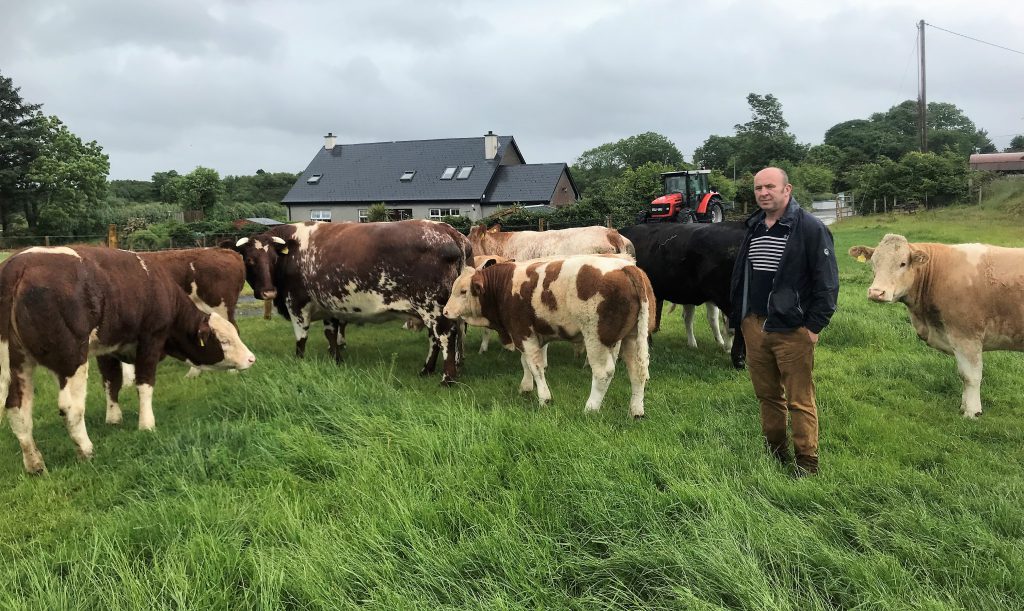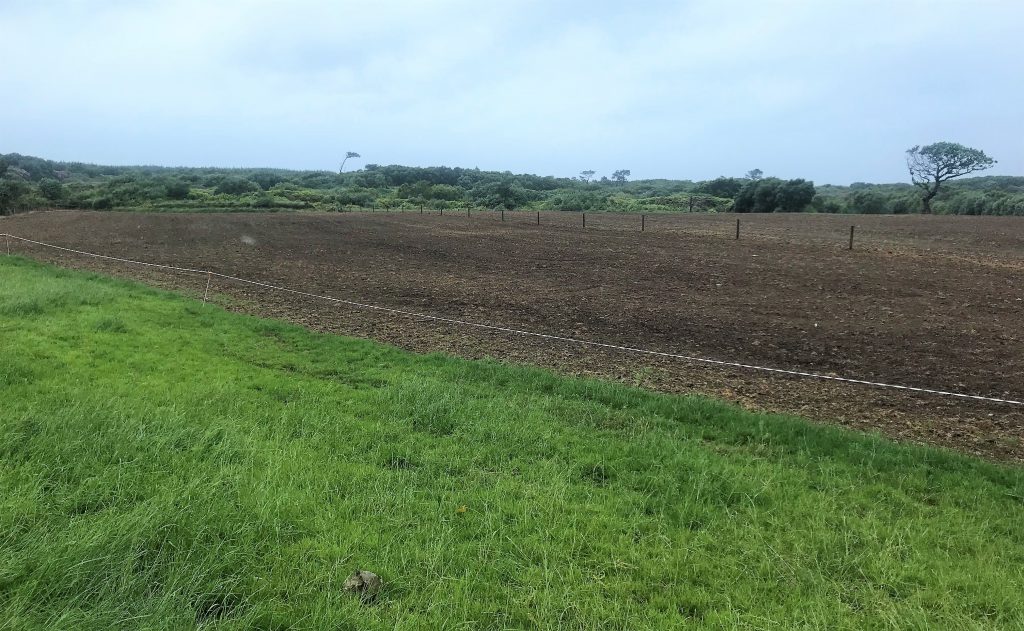Farming on the Sligo/Leitrim border, Declan Oates runs a suckler-to-weaning enterprise on 44ac of land. An additional 13ac of commonage – along the seashore – is used to carry dry cows.
The home farm is located in Tawley, Castlegal, Co. Sligo. It’s fragmented into four separate parcels of ground, which are located within a 25 mile radius.
Declan is a part-time farmer and works off-farm as an agricultural consultant. He has two young daughters – Rebecca and Bláithnaid – who both have an interest in training and showing pedigree calves.
Declan’s farm is undergoing a number of changes. By focusing more on grass and efficiency, he has cut his costs and seen the real benefits of correct grassland management.
He is gradually reseeding parcels of ground. However, he admitted that the weather in the west of Ireland poses a serious problem.
“My farm is a development project. The paddock system is the most efficient system; nothing else comes close. I can see the difference in my weanlings, there’s no doubt about it,” he explained.
The herd
Originally, Declan ran a herd of Charolais cross cows and used 100% AI. However, the Leitrim-based farmer has since made the switch to a Belgian Blue, Limousin and Shorthorn cross cow type.
These are bred to a Simmental stock bull – Monaduff Snorter. A total of 23 cows make up the herd – 21 crossbred and two pedigree Simmental cows. The cows are split into a 75% autumn and 25% spring-calving herd.
Declan made the switch for many reasons. He said: “I bought in-calf Simmental heifers in Ballymote Mart one year and then I decided to buy a Simmental bull and produce Simmental progeny.
“I knew that farmers were coming specifically to Ballymote in search of Simmental heifers to put a Charolais bull on. I saw that the market was there for them and it’s kind of a niche market,” he explained.
All male progeny are sold commercially in local marts at the age of 10 months at approximately 450kg. All heifers are sold for breeding at the Simmental Commercial Sale in Ballymote or at the Fatstock Sale in Carrick-on-Shannon; they are also sold directly off the farm.
“I have a few farmers that would buy heifers off me every year; some farmers prefer to buy them straight out of the field,” he added.
Making the switch from AI to a stock bull
Currently, the amount of suckler farms in Ireland using AI is low; somewhere in the region of 23% of progeny from the suckler herd were bred by AI in 2017.
However, Declan – who is actively involved with the Irish Simmental Cattle Society – believes that he is better off with his stock bull.
“The fragmented land posed a problem when it came to AI; it just wasn’t working. There was a lot of extra work to it.
“I’ve had a stock bull for the last 15 years and I never had a problem with a cow not going in calf, except one. It’s too hard to AI when you’re a part-time farmer; you need to be on top of heat detection.
“It’s different when you were seeing the cattle three or four times a day, but that’s not possible if you’re working off-farm,” he added.
The stock bull – Monaduff Snorter
The stock bull – Monaduff Snorter – is 13 years old. He has a replacement index of €116 and a terminal index of €78. He was purchased from the Monaduff Herd of Alex Ross in Drumlish, Co. Longford.
He sired Tawley Gretta who won the Overall Champion at the Balmoral Show in 2016. She also won the Reserve Champion at the Tullamore Show in 2016.
Another heifer sired by the same bull won two All-Ireland titles at the Bonniconlon Agricultural Show and the Fatstock Show and Sale in Carrick-on-Shannon in 2017.
She also achieved a record price for a Simmental cross heifer at the Ballymote Simmental Crossbred Sale in 2016; she sold for €6,750. Declan also has semen available.
- Award-winning heifer, Tawley Gretta
- This heifer achieved the record price at Ballymote Simmental Crossbred Sale in 2016; she sold for €6,750
- This Simmental cross heifer sold for €3,000
‘Figure farming’
The Beef Data and Genomics Programme (BDGP) is a scheme which was launched by the Department of Agriculture in May 2015. The scheme is designed to improve the genetic merit of suckler herds and reduce greenhouse gas emissions.
However, Declan has some issues relating to the programme. While he is not totally against it, he believes there are some areas which need to be addressed.
He said: “I wouldn’t be a big fan of the scheme. I think the fact that a farmer has to look at a board to see if an animal is a 4-star or a 5-star and base their decision on that is wrong.
“I still believe that the visual inspection of an animal should play a major part whether you purchase that animal or not.
“You can read all the books you want, but – until you’re out on the ground – you don’t know everything. I’d be afraid for young farmers at the moment; it takes experience to farm.
“I’m not saying down the road that figures shouldn’t play a part; but they should only act as a guide. At the end of the day, you can’t run a farm by having a book in your hand telling you what to do.
“I think there is a role for it, but in five years time when there is enough data recorded, it should play a part. But, it shouldn’t be taken as gospel,” he added.
‘Forced to rear dairy-origin animals’
The unshackling of milk quota in Ireland has led to a significant expansion of the dairy industry. With this, Declan is worried that suckler farmers – especially in the west of the country – are being pushed to rear animals of dairy origin.
“I see the quality of the cattle passing through the marts slowly decreasing; it’s going down and down and down.
“Dairy farmers in Ireland are professional people and there is real money in dairying. It pays to be professional. However, suckler farming in the west of this country doesn’t.
“Is it a coincidence that the 5-star animal nearly has to be a crossbred out of the dairy herd?” he questioned.
“I think the suckler farmers in the west of Ireland are being pushed to take the byproduct of the dairy industry; that’s the worry I have.
“I’m not farming because there’s loads of money in it – because there’s not. I like producing quality cattle. If I have to take on the dairy byproducts on this farm, I will shut that gate outside and that will be it,” he explained.
The future
Declan has explored the possibility of finishing his bull weanlings. However, he noted that adequate facilities would be a problem.
The Leitrim man also highlighted some of the issues relating to the beef industry in Ireland. On this, he said: “There are serious issues surrounding the beef industry in Ireland. If these issues are not addressed, there will be no future for it here in the west.
“Receiving €200 / suckler cow would be a help, but that’s not a long-term plan. It is a short-term measure for a long-term problem. Long term, our product needs to be appreciated more.
“It is unfair to expect farmers to produce food and not get paid a proper price for it. The costs associated with farming have gone through the roof.
“The €200 / suckler cow could lead to a lot of people getting into poor-quality cattle just to draw down the payment; there’s no long term plan; it’s not the answer.
“We need the Department and agricultural bodies to sit down and make a five-to-10 year plan,” he concluded.










